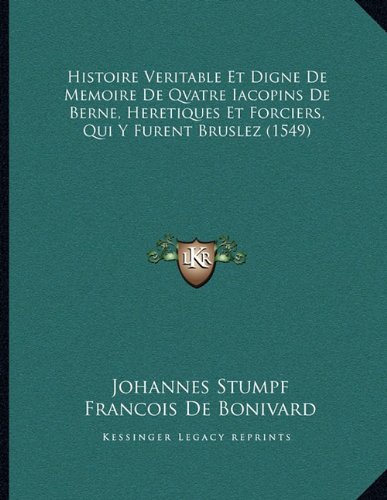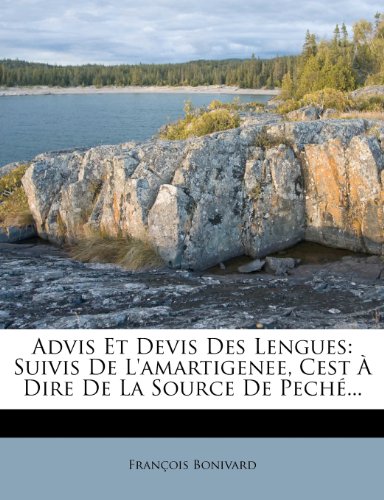Background
Francois Bonivar was born in 1493 at Seyssel, France of an old Savoyard family; the son of Louis Bonivard, Seigneur de Lunes.



(This scarce antiquarian book is a facsimile reprint of th...)
This scarce antiquarian book is a facsimile reprint of the original. Due to its age, it may contain imperfections such as marks, notations, marginalia and flawed pages. Because we believe this work is culturally important, we have made it available as part of our commitment for protecting, preserving, and promoting the world's literature in affordable, high quality, modern editions that are true to the original work.
http://www.amazon.com/gp/product/1165465175/?tag=2022091-20

(This is a reproduction of a book published before 1923. T...)
This is a reproduction of a book published before 1923. This book may have occasional imperfections such as missing or blurred pages, poor pictures, errant marks, etc. that were either part of the original artifact, or were introduced by the scanning process. We believe this work is culturally important, and despite the imperfections, have elected to bring it back into print as part of our continuing commitment to the preservation of printed works worldwide. We appreciate your understanding of the imperfections in the preservation process, and hope you enjoy this valuable book. ++++ The below data was compiled from various identification fields in the bibliographic record of this title. This data is provided as an additional tool in helping to ensure edition identification: ++++ Advis Et Devis Des Lengues: Suivis De L'Amartigenee, Cest À Dire De La Source De Peché François Bonivard Impr. J.-G. Fick, 1865
http://www.amazon.com/gp/product/1273020561/?tag=2022091-20

( This is a reproduction of a book published before 1923....)
This is a reproduction of a book published before 1923. This book may have occasional imperfections such as missing or blurred pages, poor pictures, errant marks, etc. that were either part of the original artifact, or were introduced by the scanning process. We believe this work is culturally important, and despite the imperfections, have elected to bring it back into print as part of our continuing commitment to the preservation of printed works worldwide. We appreciate your understanding of the imperfections in the preservation process, and hope you enjoy this valuable book. ++++ The below data was compiled from various identification fields in the bibliographic record of this title. This data is provided as an additional tool in helping to ensure edition identification: ++++ De L'ancienne Et Nouvelle Police De Genéve François Bonivard Fiction; Mystery & Detective; Police Procedural; Fiction / Mystery & Detective / Police Procedural; Political Science / Political Freedom & Security / Law Enforcement
http://www.amazon.com/gp/product/1293091375/?tag=2022091-20
Francois Bonivar was born in 1493 at Seyssel, France of an old Savoyard family; the son of Louis Bonivard, Seigneur de Lunes.
He was educated by various monks under the jurisdiction of his uncle, Jean-Aime de Bonivard. At the age of seven, Bonivard was sent to study at Pinerolo, Italy. He later attended the University of Turin.
In 1510 Bonivard succeeded his uncle, who had educated him, as prior of the Cluniac priory of St Victor, close to Geneva. He naturally, therefore, opposed the attempts of the duke of Savoy, aided by his relative, the bishop of the city, to maintain his rights as lord of Geneva. He was imprisoned by the duke at Gex from 1519 to 1521, lost his priory, and became more and more anti-Savoyard. In 1530 he was again seized by the duke and imprisoned for four years underground, in the castle of Chillon, till he was released in 1536 by the Bernese, who then wrested Vaud from the duke. He had been imprisoned for political reasons, for he did not become a Protestant till after his release, and then found that his priory had been destroyed in 1534. He obtained a pension from Geneva, but owing to his extravagances was always in debt. He was officially entrusted in 1542 with the task of compiling a history of Geneva from the earliest times. In 1551 his manuscripts of the Chroniques de Geneve (ending in 1530) was submitted to Calvin for correction, but it was not published till 1831. The best edition is that of 1867. The work is uncritical and partial, but is his best title to fame.
(This scarce antiquarian book is a facsimile reprint of th...)
(This is a reproduction of a book published before 1923. T...)
( This is a reproduction of a book published before 1923....)
Bonivard has been described as "a man of the Renaissance who had strayed into the age of the Reformation. " His real character and history are, however, widely different from the legendary account which was popularized by Byron.
He was four times married. The first wife was Catherine Baumgartner. After her death he was married to Jeanne Darmeis. The third wife appears to be Pernette Mazue or Mazure and the forth - an unfrocked nun, Catherine de Courtaronel or Courtavonne.
